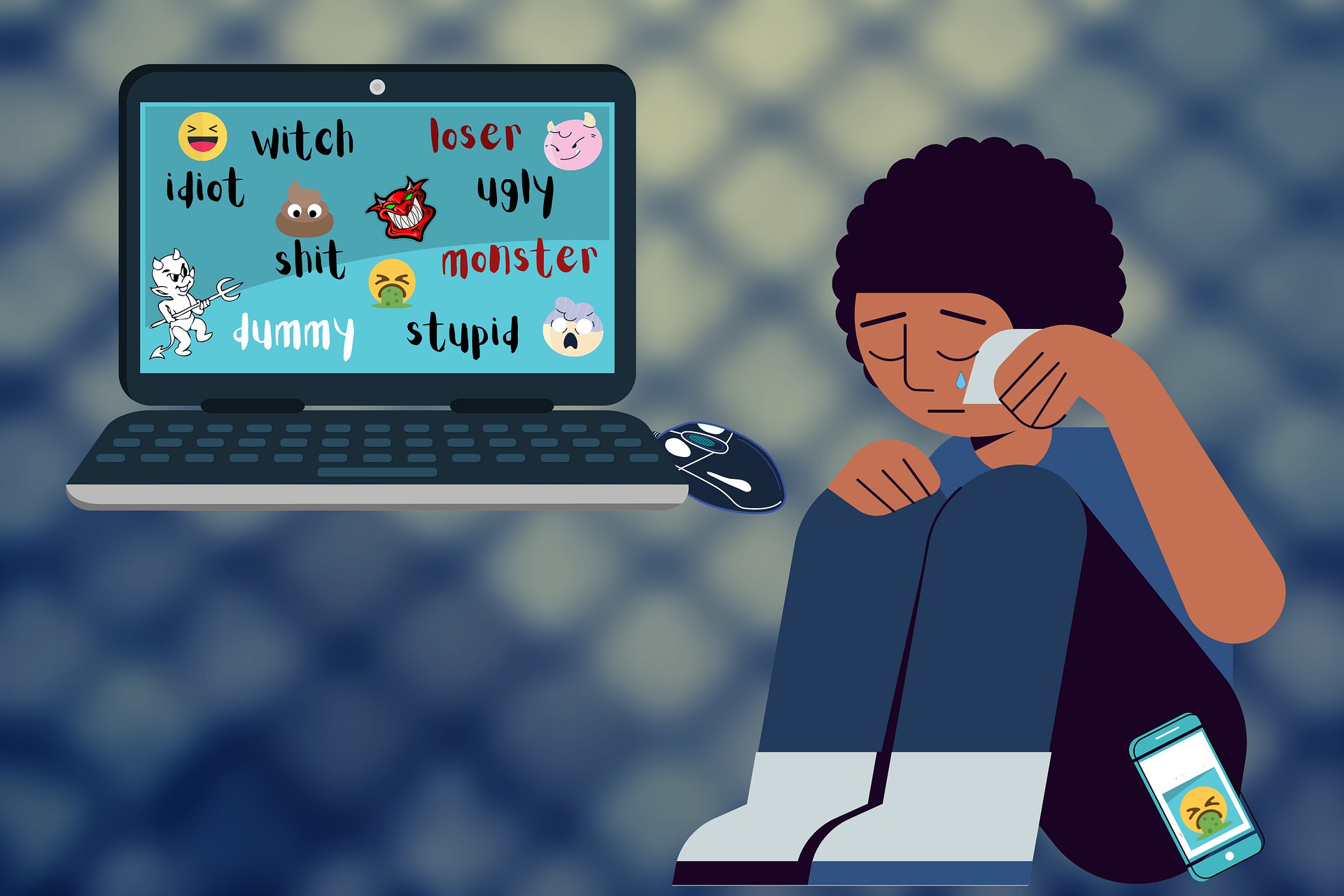Does your teenager have unlimited access to electronic devices such as a cell phone, tablet, computer, or gaming system? They could be a victim of online bullying.
Online bullying, also known as cyberbullying, occurs when your teenager’s friend or stranger sends messages, GIFs, videos, photos, or information to threaten, embarrass, harass, and intimidate them.
Online bullying takes various forms, and your teenager may not realize they are being bullied until it affects them mentally, socially, or emotionally. The table below gives you the common types of online bullying.
| Type of Cyberbullying | Definition |
| Catfishing | A bully purposefully creates a fake social media account of your teenager and tries to bully or fool others using it. |
| Impersonation | An individual takes the identity of your teenager on popular teen apps and uses the account as their own. |
| Cyberstalking | A stranger or known person to your teenager purposefully follows and tracks them until they become fearful or uncomfortable. |
| Exclusion | Your teen’s friends leave them out of a message thread or group and openly make them aware of it. |
| Trolling | A friend or stranger intentionally wants to gain attention or cause trouble by posting negative comments about your teenager. |
| Doxing | A bully posts sensitive personal information about your teen, such as their address, phone number, and photos. |
| Flaming | Bully intentionally seeks to insult, make fun of, and be mean to your teenager. They send texts, GIFs, videos, or photos with derogatory content. |
Online bullying can cause life-long mental and emotional challenges to your teenager. Hence, you need to know how to assess if your teenager has been bullied online. Today, we will discuss four crucial signs to determine if your teenager could be a victim of online bullying.
1- Scared or Nervous about Going to School
Your teen could be experiencing online bullying if they suddenly become nervous and fearful about going to school. Additionally, they could come up with unusual excuses as to why they can’t go to school while appearing desperate.
If a bully posted negative comments online or they widely shared a weird-looking photo, your teen could be afraid of facing their friends. Even when they go, the concern about their image may affect their classroom concentration.
If they are not helped to resolve the problem, the persistent bullying may also affect their academic performance.

Fortunately, teen online ‘breaking’ stories have a short lifespan, and the matter may be over within a day or two. If the fear and tension of going to school persist, there could be relatively long-term effects of cyberbullying, and it may need to be addressed by you or the school.
Sometimes it entails reporting the bullying to the app’s support team—the photo or comments are removed, and the bully’s account is suspended for weeks or months. The school platform should also take action against the students involved.
2- Appears Distressed after Being Online
A keen parent will notice when their teenager’s mood and behavior changes after being online. Your teen will be distressed and show obvious signs of stress, such as irritability, anger, violent outbursts, crying, or throwing their phone. Other less apparent signs of emotional stress include:
- Mild to moderate sadness
- Decreased appetite
- Lack of drive to engage in exciting activities
Research by Dovepress showed that 32% of cyberbullied teens showed at least one of the above signs, whether the bullying was short or long-term.

Calmly asking your teenager about their online life will help you know these occurrences and assist them in processing the distressing feelings.
In addition, managing their screen time during and after the bullying will reduce their chances of being victims again or seeing negative comments or insults.
3- Change in Sleeping Patterns
Teens who experience online bullying are more likely to have poor sleep patterns due to worry and fear about the bullying episode. Consequently, they may experience sleep difficulties which can present as clinical insomnia. These symptoms make your teenager:
- Find it hard to fall asleep
- Unable to maintain sleep throughout the night
- Wake up earlier than usual
- Wake up feeling more tired than when they went to bed
- Experience sleepiness and tiredness during the day
If your teenager shares that they have trouble sleeping, follow up on it to find the root cause. If you are already aware of ongoing cyberbullying, you can aid them in processing it by demystifying their beliefs about themselves caused by the bullying.
As an illustration, A bully shared a photo of your teenager not looking their best and included a text saying they’re weird and their friends should not hang out with them.
You can first acknowledge how painful and embarrassing the experience must be, showing that you understand how they feel.
Next, dispel the idea that they are weird and no one will hang out with them as you point out their superb qualities. Educate them that bullies are the ones with the problem and not them.
Afterward, search for natural remedies to solve sleep difficulties as you laugh about the silly ideas you find online.
By the end of the process, your teenager’s obsession with the defeating thoughts will have decreased, and they will sleep better.
4- Onset of Depression or Antisocial Behavior

According to a Kaspersky Lab and icon Kids & Youth study, 28% of teens reported having depression associated with cyberbullying, severely affecting their emotional well-being. Examples of these symptoms include:
- Low self-esteem
- Sadness
- Loneliness
- Anxiety and isolation
- Poor academic performance
- Insomnia
- Poor appetite
- Suicidal thoughts
Further, PubMed studied the relationship between depression and antisocial behavior in adolescence. They found out that teenagers who suffer from depressed mood as a result of online bullying exhibited antisocial behaviors such as:
- Isolation
- Withdrawal from most activities
- Self-harm behavior
- Physical aggression and name-calling
- Running away from home or school
- Bullying others as an act of revenge
- Delinquency and drug abuse
You may be surprised to find that the person bullying your teenage son or daughter is also a victim of bullying from friends and adults in their life, including their parents😟.
If your teenager begins exhibiting the behaviors discussed above, address them using the methods mentioned here and seek professional help. You can also contact Parenteen Kenya for guidance.
How to Deal with Online Bullying

From the discussion above, we have seen that parents and guardians need to be observant of their teenager’s well-being. Take the following steps if you suspect your teenager is a victim of online bullying:
- Listen to your teen without judging and provide support.
- Talk to your teenager and explain that it’s not their fault they were a victim of cyberbullying.
- Educate them on online bullying and how to deal with it when it happens.
- Help your teen report cyberbullying incidents to those concerned, like the school principal, class teacher, club patron, sports coach, or school counselor.
- Guide your teenager on how to stay safe online and install parental control apps that can help you track your teen’s online activities.
- When cyberbullying occurs on social media platforms, help your teen report the bullies.
- In some countries, you can file a Meta Lawsuit for Facebook and Instagram
- Your teen might want to confront the bullies. Advise them against it as it can lead to more bullying. Instead of facing the bullies, ask them to unfriend and block them.
- If you think your teen’s life is in danger, contact the police or emergency services like Child Helpline 116 Kenya.
- If your teen doesn’t feel comfortable talking to you or someone they know about their cyberbullying experience. Reach out to a professional counselor to assist.
ParenTeen Kenya can support your teenager through counseling and training them how to handle themselves online. Explore our services and assist your teenager in recovering from online bullying.
Frequently Asked Questions
Does cyberbullying affect your mental health?
Yes, cyberbullying can have a negative impact on your mental and psychological well-being. Persistent cyberbullying leads to low self-esteem, depression, and suicidal ideation. A parent with a teenager going through online bullying must monitor for these signs.
What are the best examples of online bullying?
- Sending hateful messages to someone privately or publicly
- Impersonating someone else and using the account to send mean texts
- Spreading fake rumors about someone online
- Hacking into someone else’s social media profile or online gaming
Are girls more likely to be victims of online bullying?
Yes, girls have more incidences of bullying because they tend to use more words to hurt than boys. On the other hand, boys are likely to be physical and settle their disputes without dragging them online for too long.
Images Source: Pexel and Unsplash
Jane Kariuki is a devout Christian, Clinician, Psychologist, and founder of ParenTeen Kenya. She authored an exceptional training manual used in her teens’ workshop and an instructional guidebook for her parenting classes. If she is not training, blogging, or counseling, Jane loves to spend time with her sweet husband and three children.







